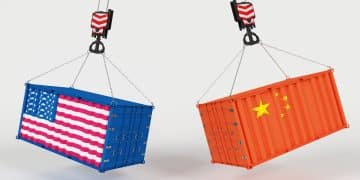Trump Persian Gulf naming policy and its implications

The Trump Persian Gulf naming policy significantly influences diplomatic relations, national identities, and economic strategies in the region, reflecting deep cultural ties and shaping international perceptions.
Trump Persian Gulf naming policy has stirred discussions about identity and politics in the region. What does this mean for international relations and diplomacy? Let’s delve into the topic and uncover its layers.
Overview of Trump Persian Gulf naming policy
The Trump Persian Gulf naming policy has emerged as a significant focal point in international relations. This policy addresses how countries and regions are referred to in diplomatic and media circles, and its implications extend far beyond mere semantics.
Background of the Naming Dispute
For many years, the naming of geographical features has been a matter of political sensitivity, especially in the Middle East. The term “Persian Gulf” has often been used in Western contexts, while some countries prefer “Arabian Gulf.” This naming conflict is not just a trivial debate; it embodies deeper cultural and historical tensions.
The introduction of new policies under the Trump administration has reignited discussions on this topic. It reflects broader attempts to solidify the United States’ stance in the region and influence local perceptions. Understanding these nuances provides insight into how naming can affect international diplomacy.
Key Impacts of the Policy
- Influence on Regional Relations: The naming policy can enhance or damage relationships among Gulf countries.
- Perception Shifts: It influences how citizens in the region view their identity and sovereignty.
- Media Representation: How the media chooses to adopt or challenge this naming can echo throughout the globe.
- Political Leverage: It may serve as a tool for political agendas in broader geopolitical strategies.
As we dive deeper into the implications, it’s crucial to see how these names shape our understanding of history and current events. Names carry weight and signify more than just a location; they reflect culture, identity, and power dynamics.
The Trump Persian Gulf naming policy shows that seemingly small changes can reverberate through international relations, affecting everything from trade agreements to military alliances. Engaging with this topic helps us appreciate the complexities of diplomacy and national identity in a changing world.
Historical context of naming disputes
The historical context of naming disputes in the Persian Gulf reveals much about regional identities and politics. Names carry significant weight, often reflecting cultural pride and national narratives. Understanding this history helps illuminate the complexities behind today’s naming conventions.
Ancient References
The term “Persian Gulf” has been used since ancient times, dating back to Greek historians like Herodotus in the 5th century BC. This long-standing name signifies the historical connections of Persia to the region. On the other hand, countries surrounding the gulf, particularly those in the Arabian Peninsula, argue for the term “Arabian Gulf,” claiming it reflects their identity and historical presence in the area.
- Historical documentation: Early maps and texts referred to the Persian Gulf, establishing a foundation for its name.
- Cultural significance: Naming conventions often reflect broader cultural and political dynamics within and between nations.
- Colonial influences: European colonialism played a significant role in shaping how names were adopted and perceived in the region.
Over the centuries, the naming of this gulf became tangled in the politics of nationalism. As countries gained independence, they sought to assert their identity through language, including the names of geographical locations. This led to rising tensions, with claims and counterclaims becoming part of political rhetoric.
Modern Political Dimensions
In recent decades, naming disputes have taken on new significance in international relations. The Trump Persian Gulf naming policy is a recent example that shows how policies can influence the ongoing debate. Countries and organizations adapt their terminology based on political alliances, which can shift public opinion and diplomatic relations.
To this day, the naming dispute continues to symbolize larger conflicts in the region. National pride, historical grievances, and the quest for global recognition all contribute to the complexity of the issue. The implications of these names are profound, as they capture the struggles for identity and representation in a geopolitically sensitive area.
Political implications of the policy

The political implications of the policy regarding the naming of the Persian Gulf are significant and far-reaching. This policy does not just affect local perceptions; it also influences international diplomatic relations, trade agreements, and military alliances.
Shifts in Diplomatic Relations
Countries using different terms for the gulf often have complex relationships with one another. For instance, the Trump Persian Gulf naming policy may lead some nations to adopt a specific terminology that aligns with U.S. interests. This shift can strengthen ties with allies but strain relations with others who prefer different terminology.
- Strengthened alliances: Supportive countries may benefit from closer cooperation with the U.S.
- Deteriorated relations: Nations resistant to the naming policy may find diplomatic channels more challenging.
- Increased tensions: The disagreement over names could escalate into larger geopolitical conflicts.
- Global perceptions: The chosen terminology can affect how the world views regional countries and their policies.
In environments where political landscapes are shifting rapidly, how names are used becomes critical. Countries might leverage these naming conventions as a soft power tactic, attempting to influence global narratives and perceptions.
Impact on Trade and Economy
The geopolitical climate created by naming disputes can have economic consequences. Trade agreements may be affected as nations align their economic strategies with their political positions on the naming issue. Countries that disagree on the naming policy may find trade relations strained, impacting essential goods and services.
Additionally, multinational companies may choose to operate in countries that align with their political beliefs, leading to economic disparities within the region. The implications of these naming conventions ripple through local economies and affect everyday lives.
Ultimately, the political implications of the policy reveal not only the complexities of international relationships but also the broader significance of language and naming in shaping a region’s future.
Reactions from Gulf countries
The reactions from Gulf countries to the naming policy surrounding the Persian Gulf have been varied and complex. Each country’s response reflects its historical ties, political stances, and national identity, deeply intertwining with regional dynamics.
Varied National Responses
Some countries have publicly supported the naming approach adopted by the U.S. under the Trump administration. They view it as a tool to strengthen their political alliances and assert their presence on the global stage. These countries might see the endorsement of the term “Persian Gulf” as a way to highlight their historical connections.
- Supportive Nations: Countries that align with U.S. interests see benefits in the naming policy.
- Cultural Pride: For many, using “Persian Gulf” reinforces a significant historical legacy.
Conversely, other nations reject this nomenclature vehemently. They argue that using “Persian Gulf” disregards their own identity and historical claims to the region. This dissent often reflects deeper tensions and is rooted in national pride.
Public Discourse and Media Coverage
The media in Gulf countries plays a crucial role in shaping public perceptions about the naming policy. Local news outlets, depending on their national alignment, either support or criticize the U.S. stance. Social media has also amplified these discussions, leading to public campaigns advocating for specific terminology.
Countries often engage in diplomatic discussions to address these names, leading to positioning statements meant to preserve national identities. Public reactions can include protests, statements from government officials, and lobbying efforts aimed at influencing international discourse.
Ultimately, the reactions from Gulf countries illustrate the multifaceted nature of regional nationalism and the intricate web of alliances and rivalries that characterize the Middle East today. Each response is a reflection of the broader socio-political landscape, revealing how deeply naming conventions can affect national narratives.
Future outlook on naming conventions
The future outlook on naming conventions in the Persian Gulf is complex and ever-evolving. As political, cultural, and social dynamics shift, the way this region is named may also change.
Shifting Political Landscapes
As global relations transform, countries in the Gulf may adapt their naming preferences to align with new alliances. For example, if the U.S. administration changes, the terminology preferred by nations could shift accordingly. This alteration can directly influence diplomatic relations and regional cooperation.
- Potential for New Alliances: Changing political climates may result in new partnerships that redefine naming conventions.
- Influence of International Organizations: Groups like the United Nations could play a role in how names are officially recognized and adopted.
- National Identity: Countries may push for naming conventions that reflect their cultural history and political aspirations.
Alongside political factors, public sentiment within each country can also shape the outlook on naming. National pride plays a crucial role in how names are perceived, and societies may rally to adopt terminology that resonates with their heritage.
Economic Considerations
The future of naming conventions may also be influenced by economic factors. As nations strive for investment and tourism, the names they choose to use can affect their international image. Positive branding can attract businesses and travelers, motivating countries to adopt names that highlight their appeal.
Furthermore, media representation and educational institutions will continue to shape public opinion. As younger generations emerge, they may advocate for terminology that aligns with their views on identity and belonging.
Ultimately, the direction of naming conventions in the Persian Gulf will depend on a blend of political, cultural, and economic influences. These factors combine to create a dynamic environment where names are more than just labels; they are essential components of identity and international relations.
FAQ – Frequently Asked Questions about the Persian Gulf Naming Policy
What is the significance of the naming conventions in the Persian Gulf?
Naming conventions in the Persian Gulf reflect cultural identity and historical ties, influencing regional pride and international perceptions.
How do political changes affect naming policies?
Political shifts, such as changes in U.S. leadership, can lead to variations in naming policies and affect diplomatic relations among Gulf countries.
What impact does public opinion have on naming conventions?
Public opinion, shaped through media and social interactions, can drive support or opposition to specific naming conventions, influencing regional debates.
How might the future of naming conventions evolve?
The future of naming conventions may change based on evolving political alliances, economic interests, and shifts in cultural identity within the Gulf region.





